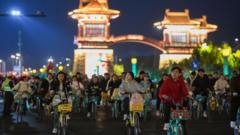In a surprising twist to a social media trend, a nighttime cycling quest for dumplings led to significant traffic disruptions between Zhengzhou and Kaifeng in central China. What began as an exciting adventure for breakfast lovers escalated into a critical situation when thousands of cyclists took to the roads, causing chaos and gridlock in the area.
Initially, the state media had encouraged the event, viewing it as a celebration of youthful spontaneity. In June, four university students kicked off the cycling movement after they traveled 50 kilometers (30 miles) to enjoy guantangbao, a popular soup dumpling. Their experience, shared on social media, inspired others in the 12.6 million-strong city of Zhengzhou, especially as the youth grappled with an unstimulating job market. "You don't get a second chance at youth; you must go for a spontaneous trip," one student reflected in the media, resonating with their peers facing burnout.
Anticipating economic boost, Kaifeng's local government even announced discounts and lively events to attract students. On the night of the journey, excited cyclists flooded the primarily empty six-lane expressway, overwhelming police forces who urged them to turn back or disperse. Bike rental companies quickly reacted, warning patrons that they would lock rented bikes if taken out of Zhengzhou.
27-year-old Ms. Li, who joined in on her motorbike, described the early atmosphere as nostalgic and vibrant, recalling a time filled with college memories. However, the situation deteriorated as thousands of cyclists turned the main road from Zhengzhou into a congested mess, with traffic times ballooning from one hour to three. Reports suggested that the number of cyclists might have reached between 100,000 to 200,000, leading to chaotic scenes where riders had to abandon their bikes and push through dense crowds.
The joyous adventure for many quickly soured when they encountered severe accommodation shortages upon arriving in Kaifeng. Frustrations mounted as reports of littering and disruptive behavior surfaced online, sparking debates over the responsibility of the cyclists. "I really regret going," lamented one cyclist online, who endured a grueling seven-hour trip only to find no available taxis or hotel rooms.
In response, major bike rental platforms issued warnings against utilizing bikes for long-distance travel after dark, advising students to use public transport instead. By the weekend, traffic authorities in both cities stepped in to restrict cycling access, taking preventative measures against large gatherings that could lead to unrest.
Despite the backlash, Ms. Li expressed that such spontaneous events reflect the desires of a stressed generation seeking joy in shared experiences. "People are so stressed these days; these events are a good thing," she remarked.

















